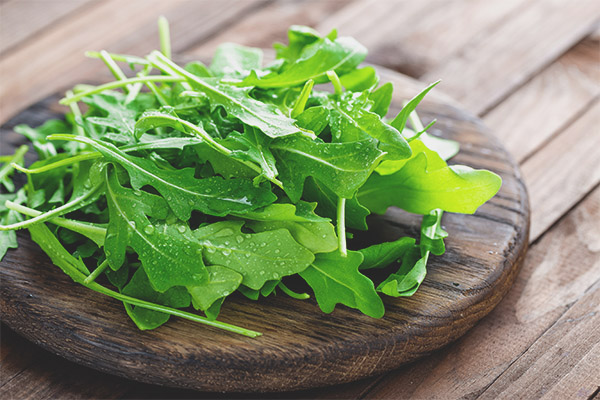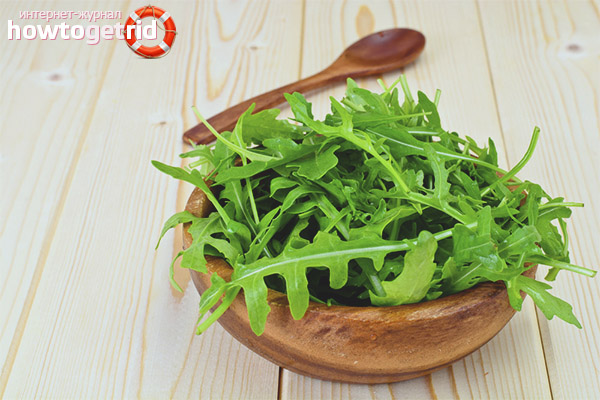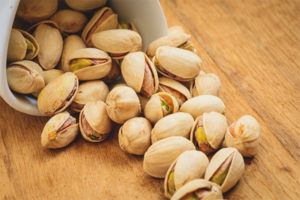The content of the article
Vegetable leafy greens, which includes arugula, is an excellent source of fiber and chlorophyll. Because of this, it is incredibly useful for the body, especially during such a stressful period as pregnancy. What vitamins and minerals are in arugula, why should expectant mothers pay attention to it, and with which product is it better to combine it?
Product features
Arugula is an annual plant belonging to the cruciferous family. Its alternative names are caterpillar or eruka. Outwardly, it looks like a dandelion, but its taste is very different: intense pepper notes with a bright nut-mustard aftertaste dominate in arugula. Remotely, it resembles sorrel.
In cooking, it appeared relatively recently, since it was originally considered a weed and was used only as animal feed.Today it is a very popular spice that gives fish and meat dishes a unique flavor. Arugula serves as a base for salads, and especially reveals its taste in combination with soft cheeses, olive oil, garlic and balsamic vinegar. The fashion for it is associated with the popularity of Italian and Mediterranean cuisine, in which it is found in almost every dish. But it is also in demand due to the healing effects on the body.
Like any other greens, arugula is a low-calorie herb. 100 grams contains only 25 kcal. At the same time it contains antioxidants, flavonoids and vitamins, especially useful for women in the situation.
The unique properties of arugula
Since pregnant women need a special diet, eruka can be one of its most important components, because:
- The main benefit of arugula falls on the digestive tract. It is due to the high concentration of fiber, it stimulates intestinal motility, allowing you to normalize the daily stool.
- Arugula is considered a very effective diuretic. Even a minimal amount of it can reduce the swelling characteristic of many women in the position.
- It belongs to the category of natural immunity stimulants.Therefore, its regular use during all 9 months will help in the fight against seasonal colds.
- Vitamin E in Eruki minimizes the risk of miscarriage and contributes to the normal development of the fetus. In its effects on the body, it is identical to progesterone: it improves the maturation of the placenta, preventing its detachment.
- 100 g of arugula contains the daily rate of vitamin K. It promotes the formation of bone tissue in a child, strengthens muscle contraction, provides the body with energy. For pregnant women, it is necessary for the production of prothrombin - a chemical compound responsible for blood clotting.
- This famous Italian herb is rich in inulin. This is a prebiotic necessary for the normalization of intestinal microflora. It contributes to the "attachment" of lactic and bifidobacteria to the gastrointestinal mucosa, as well as the removal of heavy metals from the body.
You also need to consider that per 100 grams of this herb accounts for 2.1 g of sugar (this is 3% of the daily value for an adult).
Contraindications
Even taking into account the beneficial effects of arugula on the body, in some cases it is better for pregnant women not to eat it.In particular with:
- increased uterine tone;
- urinary dyskinesia;
- individual intolerance to the components. In this case, the manifestation of an allergic reaction.
It is also better to abandon its use during breastfeeding.
Rules for the selection and storage of arugula
Arugula has small green leaves, pleasantly crunchy on the teeth. Ideally, it should be grown on its own, as this guarantees the absence of pesticides in its composition. In addition, it is very unpretentious grass, which will rise even on the windowsill. But in the absence of such an opportunity will go and shop.
Choosing arugula, you need to pay attention to the leaves: they must be completely green and not wilted. Their taste depends on the size: the smaller they are, the more bitter they are. Therefore, choose arugula is strictly based on personal wishes.
Useful advice: before eating any herbs or leafy vegetables, rinse them thoroughly under running water, then leave it in a deep bowl full of water for only 20 minutes. So you will not only wash off all the dirt from it, but also clean it of chemicals present in the composition.
Gentle leaves of arugula do not like cold, so it is best to store it in the "warmest" places of the refrigerator, and preferably in a container with water. Leaving it there for more than 3 days is not necessary - the less it lies, the more it has both taste and nutrients. In the case of long-term storage, it should be pre-washed, dried and cut into small pieces, put into the freezer.
Arugula: Use in Cooking
Minor use of arugula
Mustard oil obtained from arugula is widely used not only in cooking, but also in cosmetology. It has a beneficial effect on the condition of the hair: it strengthens the hair follicle and restores their structure along the entire length. In everyday life, you can easily prepare the following mask: two tsp. mustard oil (you can buy it in almost any supermarket) needs to be rubbed into the skin of the head, rolled up with a towel and left for several hours.
In folk medicine, arugula is used to make an infusion with which wounds are subsequently treated. The juice obtained from it is effective in the fight against corns, polyps and ulcers.
In the absence of contraindications, pregnant women need to add arugula to their daily diet. It will add a touch of astringency to vegetable salads and enrich the body with nutrients.
Video: useful properties of arugula











To send